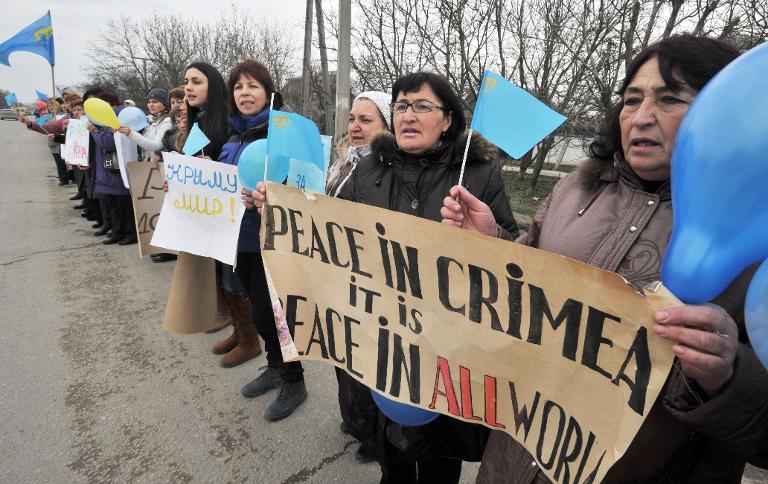
At the Great Mosque in Bakhchysaray, near the southern tip of the Black Sea region, the local Tatar representative Akhtem Chiygoz slams the March 16 vote as "illegal".
The referendum is meant to confirm Thursday's decision by Crimea's pro-Moscow parliament to become part of the Russian Federation, even though the authorities in Kiev have deemed it "illegitimate".
Just before prayer, Chiygoz urges some 100 faithful in the nearly 500-year-old mosque to keep calm and not "give in to provocations".
Rushing by, the young imam adds quickly "we are for peace, that's all".
Over the past week, pro-Russian forces have gradually taken control over the rugged peninsula of two million.
While the move has been greeted by Crimea's Russian-speaking majority, it has drawn a less than enthusiastic response from the minority Tatars.
"There is no extremist rhetoric in our community," says Dilaver, 33, in response to comments about radical elements in the population.
"The only real threat is Russia, where there is no freedom of speech."
Eskender, a respected elderly man in the crowd, is equally outspoken: "We will not take part in the referendum, it's organised by Russian separatists."
But if a choice is to be made between annexation and a full blown conflict, joining Russia "will still be less awful than war," he admits.
Reports that panicked Tatars are fleeing Crimea amid Russia's tightening grip are mere "rumours," says Eskender.
A few hundred internal refugees have indeed left the peninsula in recent days and found refuge in western Ukraine, including the city of Lviv, many of them Tatars. But this represents a small fraction of the minority's population of 240,000-300,000 -- or 12-15 percent of Crimea's two million.
Tatar leader calls for NATO intervention in Crimea 'before massacre'
Tatar community leader Mustafa Dzhemilev on Thursday urged NATO to intervene in Crimea to avert a "massacre" and called on the Crimean Tatars to boycott the upcoming referendum to join Russia.
"If other measures do not work, then NATO should intervene like in Kosovo," Dzhemilev told AFP in a phone interview from Brussels, where he was preparing to meet NATO officials on Friday.
NATO intervention "usually only happens when there is a massacre, we want it to happen before there is a massacre," said Dzhemilev, currently a lawmaker in Kiev who spoke with Russian President Vladimir Putin in a phone call earlier this week.
"I told him that we would not wage war against Russia but that we would struggle for the territorial integrity of our country. We still have to decide on what methods we will use," the Tatar said.
Dzhemilev also criticised inaction in the West, saying: "We haven't seen any serious steps from the West. They imposed visa bans but so what? Those people (targeted by the bans) have a comfortable enough life in Russia."
Tatars are planning a series of demonstrations across Crimea on Friday ahead of Sunday's vote under the slogan: "No to the illegal referendum!"
"We are calling for the Crimean Tatars to boycott the referendum," Dzhemilev said.
"This referendum has no meaning. I told Putin it was against our law. Nobody will recognise it, especially since it's being held in an occupied territory."
Suspicion of Moscow is high among the Tatar community, who were the original population of the Crimean peninsula and were deported en masse by Stalin to Central Asia during World War II.
The Tatars only started returning home in the late 1980s and currently number around 12 percent of Crimea's mostly Russian-speaking population of two million people.
They have maintained their Turkic language and Sunni religion and Turkish Prime Minister Recep Tayyip Erdogan has also pledged his support.
'What threat?'
Referring to the deployment of Russian forces across Crimea, Dzhemilev said: "They've occupied our land and are planning to annex it in front of the whole world. This wasn't allowed in the 20th century but now it seems it is."
"They said there's a threat to Russians? What threat? They're all Russians there! Are they going to deport the Tatars again?"
"I told Putin that this is unjust and I expressed our deep concern that there could be clashes," he said of his Wednesday conversation with the Russian leader.
"He said he would ensure this would not happen and asked that the Crimean Tatars not carry out any acts of violence."
"Putin said he had given an order not to touch the Crimean Tatars," Dzhemilev added.
Summarising the interaction between the two men, the Tatar leader said: "He told me his point of view, I told him mine."
"He said: 'Let's wait for the referendum'. I said: 'We know what's going to happen and there's no point'. He said: 'Let's talk again after March 16'".
Crimeans will vote Sunday on whether to join Russia, in a referendum that has been slammed by the pro-European authorities in Kiev and world powers as illegal, while Russian forces continue to occupy the strategic Black Sea peninsula.










1732354127-0/Untitled-design-(3)1732354127-0-270x192.webp)






COMMENTS
Comments are moderated and generally will be posted if they are on-topic and not abusive.
For more information, please see our Comments FAQ